To further inherit the outstanding traditional Chinese culture, promote the unique charm of Sichuan opera arts, and facilitate academic exchange between students of Hong Kong and Chongqing, the 2018 “Qufeng Yayun Traditional Culture Experience Camp for College Students of Chongqing and Hong Kong” organized by Chongqing University is going on between June 1 to 7, 2018. This Culture Experience Camp is sponsored by the Office of Hong Kong, Macao and Taiwan Affairs, Department of Teachers’ Work and Propaganda Department of Chongqing University, utilizing resources of the Sichuan Opera Culture Inheritance and Preservation Base of Chongqing University under the Ministry of Education. The content of the event includes experience and appreciation of Sichuan opera vocal music, instrumental music, opera dancing and modeling. Campers are more than 30 current students from Hong Kong University, Chinese University of Hong Kong, Open University of Hong Kong and Chongqing University.
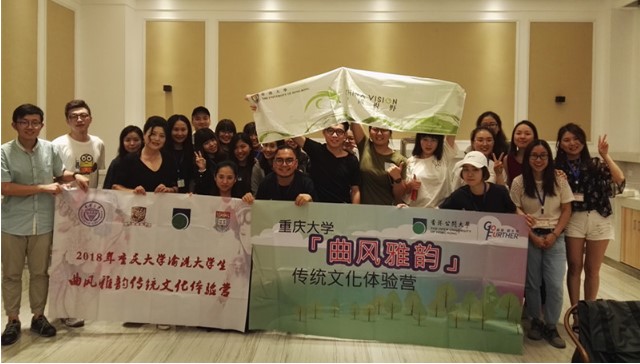
On the afternoon of May 31, nearly 20 students from Hong Kong University, Chinese University of Hong Kong, and Open University of Hong Kong arrived in Chongqing. A welcome dinner party was held for students from Hong Kong at the students’ dining hall of Huxi Campus. Peng Shujuan, deputy head of the Department of Teachers’ Work, Mr. Sun Weiqun of the Office of Hong Kong, Macao and Taiwan Affairs and some volunteers have attended the dinner party. At the Party, students displayed their talents and played games such as gesticulating and guessing and got to know and understand each other.
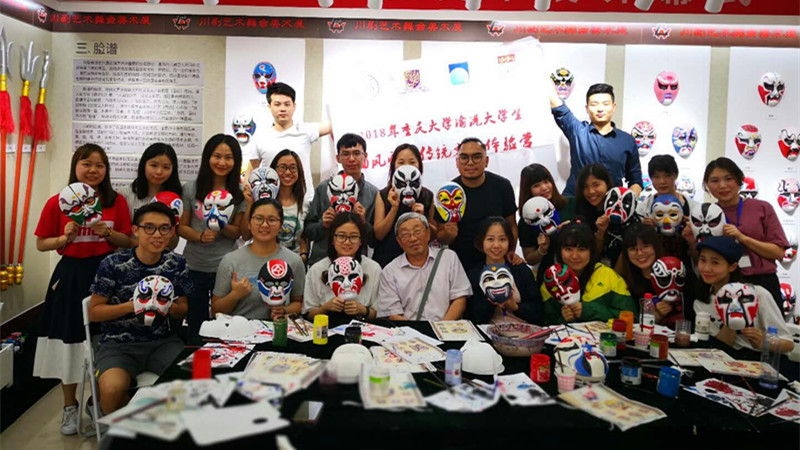
On the morning of June 1, the launching ceremony of the 2018 “Qufeng Yayun Traditional Culture Experience Camp for College Students of Chongqing and Hong Kong” was held in Classroom 403 of Meishi Film Academy. At the ceremony, Peng Shujuan delivered an opening speech for the camp. After that, Professor Peng Jixiang, managing vice dean of Meishi Film Academy delivered a themed speech titled Traditional Chinese Culture and Sichuan Opera Arts, in which he went through the Chinese cultural characteristics and Chinese aesthetic features that lie in Sichuan opera and expounded on the relation between Sichuan opera and traditional culture of China. Students obtained a comprehensive understanding and knowledge of Sichuan opera as a form of opera. On the afternoon of the same day, teachers and students of the Sichuan Opera Culture Inheritance and Preservation Base put on a “Qufeng Yayun” themed performance. The show that combined aria, face changing and water sleeves was highly praised by the audience and won continuous applauses. Upon the end of the performance, students were guided to the Sichuan Opera Stage Art Workshop of Meishi Film Academy to experience drawing of facial makeup of Sichuan opera. They also learned something about the stage arts such as figure performance in Sichuan opera. The close contact with Sichuan opera allowed them to appreciate the unique cultural deposit and charm of Sichuan opera.
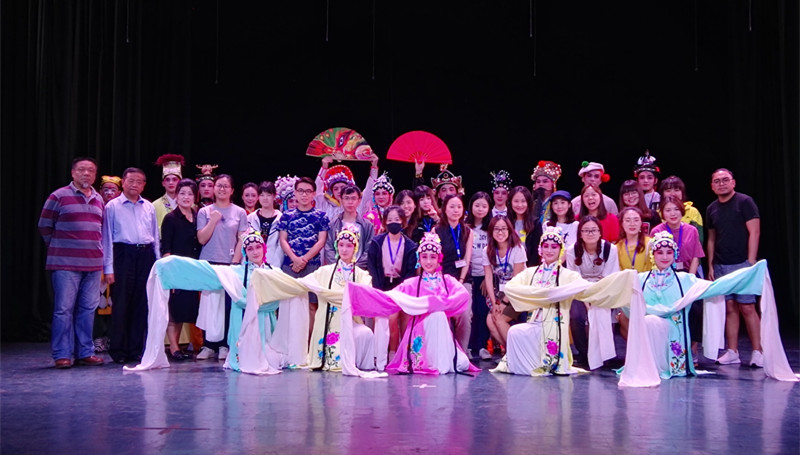
On June 2, Wei Yuan, a student of Youlan Opera Club of Chongqing University, introduced the students from Hong Kong and Chongqing to the basic information on the Club, and characteristics of costumes, headwear and makeup of Sichuan opera. Tang Jinting from Chinese University of Hong Kong, and Lin Tianhan and Ye Jiajia from Open University of Hong Kong experienced the makeup process and figure modeling of Sichuan opera with the help of students of the Club. They enjoyed the experience very much.

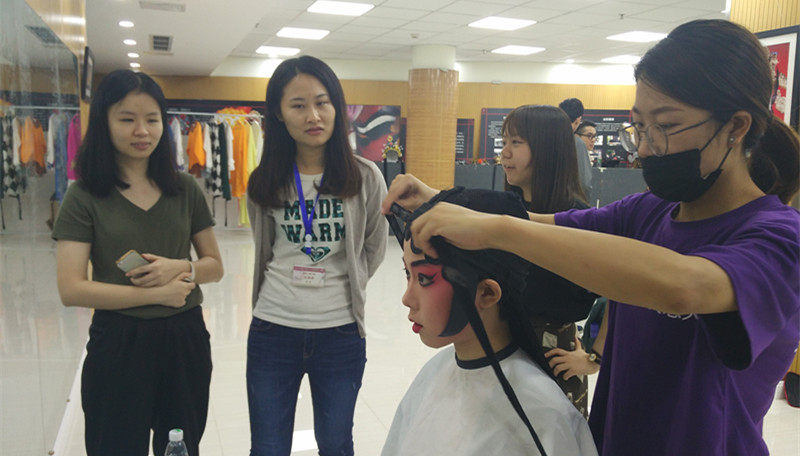
After watching the Sichuan opera show and experiencing drawing of Sichuan opera facial makeup and performing a figure in the opera, the students were fascinated by the charm of Sichuan opera and could not resist their urge to put on the costumes and perform on the stage. On June 3, the students arrived at the School of Arts at Huxi Campus to learn the Sichuan opera song named A Song of the Moon over the Emei Mountain from Ms. Xiao Ling. They also learned basic movements of opera dancing from students of the Department of Dancing.
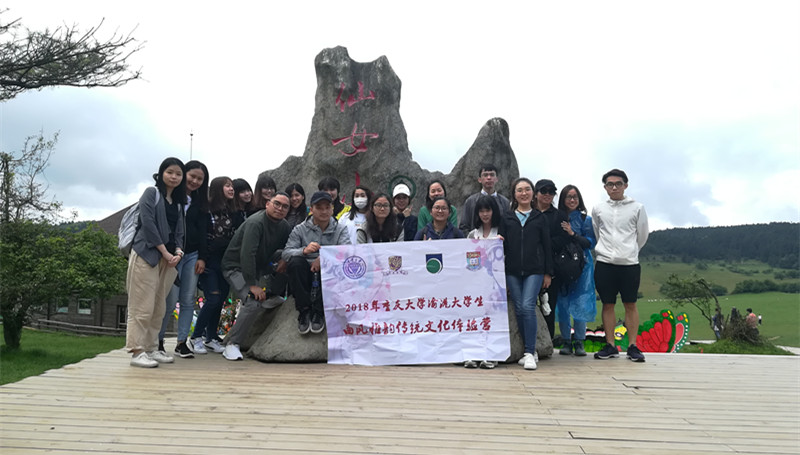
During the event, to enhance the experience of folk culture of Chongqing, students from Hong Kong and Chongqing took a bus to Fairy Mountain National Forest Park to take part in the outdoor experiencing activity. Students went on a hiking on the borderless grassland and climbed the steep cliff of the Heavenly Pit and Earthly Fissure. At dusk of the same day, students watched the large-scale live-action show named Impression of Wulong, which included Chuanjiang Haozi, story of boat trackers, wedding lament as a traditional custom of Tujia, origin of Chongqing hot pot, and jampan, which is exclusive to Chongqing. Liu Tianjiao, a student from Chongqing University, says that: “I have been in Chongqing for nearly 1 year, but I never had an opportunity to see such fantastic natural scenery. I think Chongqing people are warmhearted, forthright, smart and tough because they live in such an extraordinary geographical environment.”

On the morning of June 6, Lin Yawen, director of the Office of Economic and Trading of the government of Hong Kong Special Administrative Region in Chengdu, and Su Zixian, director of the Liaison Office of the government of Hong Kong Special Administrative Region in Chongqing, had panel discussion with students from Hong Kong. Su Zixian spoke highly of the “Qufeng Yayun Traditional Culture Experience Camp for College Students of Chongqing and Hong Kong”, and believed that the friendship between students from the two places would be strengthened and their horizon broadened through cultural exchanges. After students from Hong Kong shared their gains and feelings in this activity, Lin expressed her hope that Chongqing University would organize more exchange activities of this kind to promote communication between the two places. The Liaison Office of the government of Hong Kong Special Administrative Region in Chongqing would give support. After the meeting, Sun Weiqun guided the students from Hong Kong to the Chongqing Planning Exhibition Gallery and the People’s Liberation Monument, both of which are landmarks of Chongqing. This way, students gained clearer and complete understanding of the future and past of Chongqing. At 7:00pm of the current day, students from Chongqing and Hong Kong watched a show named Arts of Chongqing jointly arranged by Chongqing Sichuan Opera Theatre and Chinese Artists Association HK at Chongqing Sichuan Opera Art Center. The show was performed by famous factors and actresses from Chongqing and Hong Kong, and marked a successful end of the Camp.

“I’ve heard about Li Bai before I came to Chongqing. But I never learned the Song of the Moon over the Emei Mountain. In learning dance modeling of Sichuan opera and Sichuan opera dancing, I understood how much effort the performers have to make before they can hold the stage. I’m grateful for the considerate arrangement of teachers and students of Chongqing University. I would like to thank them for the special cultural feast they’ve provided.” Tang Jinting, a student from the Arts Department of Chinese University of Hong Kong, says with gratitude.
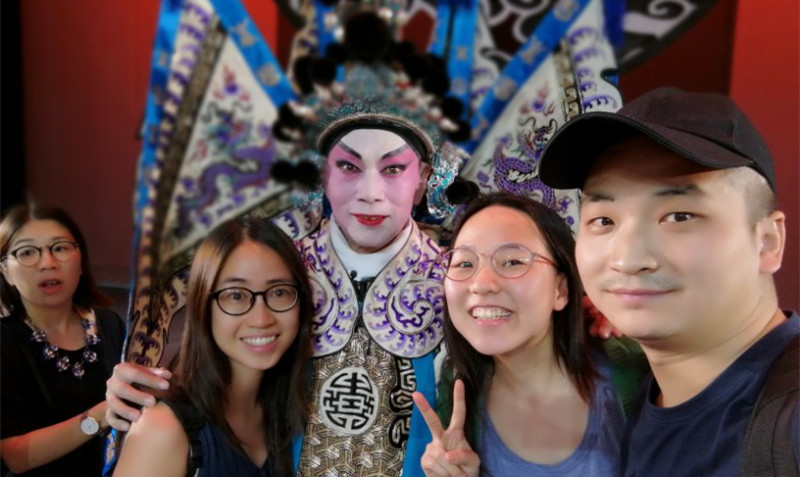
The Camp has seen a successful end. It has not only provided a platform for communication and exchange between students of the two places, but also allowed more and more young people to appreciate the arts of Sichuan opera, the spirit of opera and charms of traditional culture. In addition, it helped with inheritance and promotion of opera as outstanding traditional Chinese culture, and enhanced the “cultural confidence” and vitality of the students. In the future, Chongqing University will organize similar activities in the future, and allow Sichuan opera to play a positive role in cultural inheritance in the process of “Double-First-Rate” construction.
